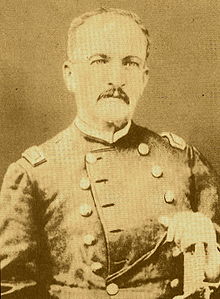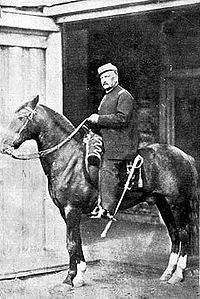- Manuel Baquedano
-
Manuel Baquedano 
Chief of Government In office
August 29, 1891 – August 31, 1891Preceded by José Manuel Balmaceda Succeeded by Jorge Montt Personal details Born January 1, 1823
Santiago, ChileDied September 30, 1897 (aged 74)
Santiago, ChileManuel Jesús Baquedano González (January 1, 1823 – September 30, 1897) was a Chilean soldier and Chief of Government, who served as Commander-in-chief of the Army during the War of the Pacific. Manuel Baquedano was of Basque descent.[1]
Contents
Early life
Manuel Baquedano was born in Santiago, the son of Fernando Baquedano and of Teresa González de Labra y Ros. He studied at the school of clergyman Juan Romo and at the Instituto Nacional of Chile. During this time he became lifelong friends with Federico Errázuriz and Eusebio Lillo. Baquedano was only 15 years old and still at school when the War of the Confederation exploded. He then fled his house to join the troops leaving for the War. He participated in the Battle of Yungay in 1839, being promoted on the field to Lieutenant at the age of 16.
Military career
Manuel Baquedano returned to Chile and completed his military training. He was promoted to regular Lieutenant on January 23, 1845, and in January 1850, while holding the Adjutant in the Grenadiers, Baquedano was promoted to full Captain. During the Revolution of 1851 in April 1851, Manuel Baquedano's presence helped the Palace of La Moneda when he played a decisive role in the confrontation with the troops that rebelled, on the 20th day of that month, against the election of Manuel Montt as President. These rebels were commanded by Colonel Pedro Urriola who was supported by young liberals, among whom he counted his friend Eusebio Lillo. The revolution was followed by an armed navy revolt at Concepción by troops controlled by José María de la Cruz. Baquedano was named adjutant of General Manuel Bulnes and participated alongside the government's forces in the battle of Loncomilla, in December 1851. There, he faced his father and brother Eleuterio Baquedano, finishing the battle he requested permission to visit his father, head of the enemy army's General Staff, wounded in battle.
Manuel Montt granted him a promotion for his services to Sergeant Mayor of the government escort in January 1852.
Temporary retirement
In April 1854, he lost his commission as mayor of the city of La Frontera over a confused barracks mutiny incident in which his real involvement was never clarified. Baquedano then resigned from active service, and with his savings acquired the small Santa Teresa hacienda near the city of Los Angeles.
The government did not accept his resignation and so he was named adjutant of the commanding general of the military in Valparaíso in March 1855. Before a petition by himself Baquedano, in April was transferred with equal position to the commander of arms in Arauco, in order to be closer to his home. In August of that year he was designated commander of the civilian militia #3 in Arauco. Between 1855 and 1869 he dedicated himself to transforming his home into a productive agricultural property, and in 5 years this had already brought him a small fortune.
Return to military life
Baquedano returned to military life in 1859, when the government called him to face the revolution that exploded in Concepción; for his services he was promoted to effective sergeant major in June of that year. Seven years later, in October 1866, colonel was promoted to lieutenant again, happening to act as in the city of the Angels, those that combined with their agricultural workings. By the end of 1868 were required again in the Army, to oppose to the indigenous rebellion headed by Quilapán and other caciques. Under the orders of general Jose Manuel Pinto, commander of the forces of the high border, he participated in numerous confrontations in Malleco and Renaico, from January to May 1869. By his services, September of that year, the control of the regiment Cazadores a Caballo (Hunting to Horse) was trusted to him, the same position that his father had held.
The control of the regiment Cazadores a Caballo, was transferred to Santiago. Their military services in Araucanía and his personality opened with the civil world, allowed him to gain a prestige in the liberal governments and the santiaguina population. In July 1870, he was promoted to colonel and two years later effective colonel by the government of Federico Errázuriz Zañartu was named. In 1875, he was designated, in temporary form, chief inspector of Guardia Nacional (National Guard) and commander-in-chief of Arms of the capital city.
War of the Pacific
"An Army, like ours, shaped by self-denial, patriotism, and great civic virtues could not be defeated; it is an army of citizens transformed into lions consorting with victory. If we have won, we owe it to our soldiers and to our citizens." General Manuel Baquedano's victory speech, April, 1881. In 1876, Baquedano was promoted to brigadier general. When War of the Pacific with Peru and Bolivia broke out in April 1879, he was general commander of the cavalry. In November 1879 he disembarked his troops in Pisagua under orders from commander-in-chief General Erasmo Escala. At that stage, the general command was torn by infighting between General Escala and the Minister of War and Navy over who was in charge of operations. The conflict was finally resolved with the resignation of General Escala on March 28, 1880, caused by ...the criminal insults inflicted by Mr. Rafael Sotomayor to his rights and his dignity.
General Escala's resignation left the army in a very vulnerable situation. The soldiers' morale was at a low ebb, being engaged in disputes, gossip and internal rivalries. To solve the problem, the minister Rafael Sotomayor appointed General Baquedano as commander-in-chief, saying ...where Baquedano goes, gossip does not follow.
Soon he followed the campaign on Tacna and Arica, disembarking in February 1880 in Ilo. To the control of a division, faced the Peruvian Army in the Cerro de los Ángeles (the Angels hill) in March of that year. One stood out by his decision for the military resolutions, thus was promoted in June to major general. He participated in the battles of Tacna and Arica.
The military reputation of Baquedano was enhanced by his outstanding direction and participation in the battles of Chorrillos and Miraflores, in January 1881. There, thanks to the efforts of the men under his command, the Peruvian capital was occupied in less than a month. Baquedano returned to Chile when the government of President Aníbal Pinto decided that most of the Army he had to return, due to the high cost of maintaining troops. He arrived at Valparaiso in March 1881 and was received by a large crowd; the celebration was repeated in Santiago.
Later life
He was twice offered a presidential candidacy, but on both occasions the campaign did not prosper. By means of a law passed in August 1881, the government of Domingo Santa María granted - by the rest of his life honors, pays and allowances to him like commander in chief in campaign.
The following month, he was named advisor of State, and was chosen as a senator by Santiago during 2 periods, between 1882 and 1888, and by Colchagua for another 2, between 1888 and 1894. From these positions he participated in the reorganization of the Army and cooperated in the commissions so that the Academy military and the General Staff were based. In April 1889, President José Manuel Balmaceda sent him on a mission to Europe, from which he returned in November 1890.
During the Chilean Civil War, Baquedano did not side with either political party. But, after Balmaceda's forces were overcome and destroyed at the battle of La Placilla, it was clear that the President could no longer hope to find a sufficient strength amongst his adherents to maintain himself in power. On August 29, 1891, Balmaceda officially handed power to General Baquedano, who maintained order in Santiago until the arrival of the congressional leaders on the 30th. He then handed power to Navy captain Jorge Montt on the 31st, and retired definitively to private life.
He died at his home in Santiago, at the age of 74
There is a commemorative statue of him, mounted on his horse, by the Edificio Telefonica in Av Providencia at Santiago.
References
External links
- Official Chilean Army Biography (Spanish)
Political offices Preceded by
José Manuel BalmacedaChief of Government
1891Succeeded by
Jorge MonttMilitary offices Preceded by
Erasmo EscalaField Army Commander-in-chief
1880-1881Succeeded by
Cornelio SaavedraPresidents of Chile Blanco Encalada • Eyzaguirre • Freire • F. Pinto • Vicuña • Ovalle • Ruiz-Tagle • Ovalle • Prieto • Bulnes • M. Montt • Pérez • Errázuriz Zañartu • A. Pinto • Santa María • Balmaceda • J. Montt • Errázuriz Echaurren • Riesco • P. Montt • Figueroa • Barros Luco • Sanfuentes • Alessandri Palma • Figueroa • Ibáñez del Campo • Montero • Dávila • Alessandri Palma • Aguirre Cerda • Méndez • Ríos • González Videla • Ibáñez del Campo • Alessandri Rodriguez • Frei Montalva • Allende • Pinochet • Aylwin • Frei Ruiz-Tagle • Lagos • Bachelet • Piñera Categories:
Categories:- 1823 births
- 1897 deaths
- People from Santiago
- Members of the Senate of Chile
- Chilean Army generals
- Chilean people of Basque descent
- People of the War of the Pacific
Wikimedia Foundation. 2010.

